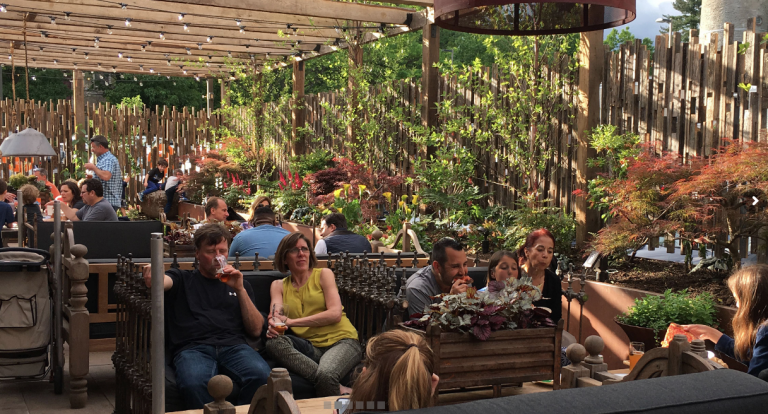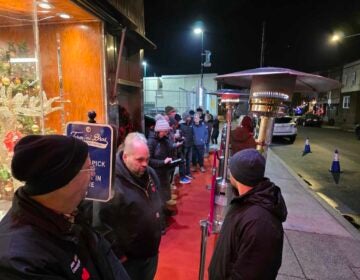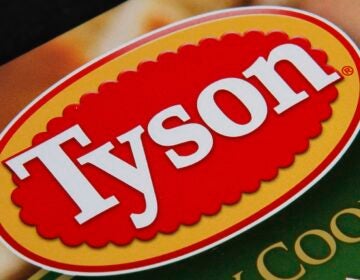Has Market at Fareway violated a 40-year covenant? Some in Chestnut Hill think so
They are suing the market's owner, Glengarry Properties, saying it has violated an almost 40-year-old deed-restricted covenant on the land.

Patrons at the Chestnut Hill Brewing Co., part of the Market at Fareway. (courtesy of Chestnut Hill Brewing Co.)
This story originally appeared on PlanPhilly.
—
Around 8 o’clock on a recent weeknight, Chestnut Hill’s Market at the Fareway is a hive of activity. Food vendors inside the old car barn are doing a brisk trade in artisanal pizzas, Korean fried chicken, and craft beer.
There is barely a free chair to be found, and the air buzzes with conversation, underscored by the keening cry of children losing at pingpong.
Patrons all attest to their love of the market’s outdoor seating area, fenced off from the surrounding parking lot by a greenery-laced trellis. They express immense dismay about the legal battle being waged over the future use of the space.
It’s not like this is the kind of place where someone is going to chug 12 beers and start a fight, they cry. Why can’t we all just get along?
“There’s still an entire parking lot between where we are sitting now and where the homes are,” said local resident Ash Hanson. “I can imagine if people came here and got rowdy it might be different, but this is a relatively grown-up population. Even the children — well, here mine are wrestling with each other — but mostly even they are well-behaved.”
But a group of 25 neighbors on Ardleigh Street and Hartwell Lane disagrees. They are suing the market’s owner, Glengarry Properties, saying it has violated an almost 40-year-old deed-restricted covenant on the land.
The lawsuit could potentially shut down much of the Market at Fareway’s activities, indoor and outdoor, because the covenant’s terms include a limit of only two businesses in the space and a ban on cooking and baking activities.
The neighbors group’s lawyer, Fintan McHugh, says they are pushing a hardline position because Glengarry Properties has been slowly expanding its operations into the parking lot and its hours later into the night.
Only a handful of the Germantown Avenue market’s vendors stay open past 6 p.m., but those include Chestnut Hill Brewing Co., whose own website says it closes at 8 on the weeknights it is open and at 10 on Friday and Saturday nights. The Market at Fareway’s website lists Chestnut Hill Brewing’s weeknight (Wednesday and Thursday) closing time as 9 p.m.
Since the case was first brought to the wider public’s attention by the Inquirer and Daily News, neighbors on Ardleigh and Hartwell have decided against talking further to the press.
But McHugh insists that this isn’t a case of NIMBYs gone wild. His clients aren’t anti-fun, he said, but they are in favor of being able to get some sleep.
“Right now, we are trying to fully enforce our rights, but we’ve gone to them on the side and said, look, we are willing to let you keep your current tenant mix and memorialize this in a new set of restrictions,” said McHugh. “If you want to play ball with us, we are willing to compromise. But you have to shut things down at 10.”
Signed on April 14,1981, the restricted covenant was agreed to by previous owners of the Chestnut Hill Hotel, which sits just to the northwest of the Market at Fareway, in exchange for the neighborhood’s support of its quest for zoning variances and a liquor license.
The document reads that the parking lot, on which the market’s outdoor seating area encroaches, “shall be used solely and exclusively for parking and for no other purpose whatsoever.” (A handful of other acceptable alternative uses are listed, though, including “landscaping and other aesthetic endeavors.”)
The agreement stipulates that the owners can operate only two retail shops in the building that now houses the Market at Fareway — which currently hosts well over a dozen eateries in a Reading Terminal Market-like fashion—and forbids a host of activities from occurring there.
Those range from a ban on the sale of pornographic material, as well as pinball arcades, auto-repair facilities, “Five and Ten stores (such as Grants or Woolworths),” and anything that features baking or cooking on the premises.
In short, Glengarry Properties’ lawyer says, the covenant has already been routinely, and repeatedly, broken. There have been shops in the market selling food cooked or baked on the premises for decades.
“The market had restaurants in it since the 1980s, which is arguably, and I do mean arguably, the only technical violation of the covenant,” said Ralph Wellington, who represents Glengarry. “But they’ve been operating there for 35 years, and no one ever said anything about it. We don’t think the covenant has any legal validity at all.”
Wellington is relying on an obscure legal principle called the “doctrine of laches,” which basically maintains that legal claims have to be acted upon quickly. In this case, he said, the neighbors have been allowing violation of the covenant for decades, and they can’t just enforce it now that the beer garden has encroached upon the parking lot and there’s more outdoor seating available.
Some of the opposition seems to run deeper than the fight over operating hours. In the Inquirer article, one of the neighbors suing Glengarry stated that she also feared that the owners — or someone else in future — could tear up the parking lot and throw up a tall building if the covenant no longer holds.
“That was a concern some neighbors have voiced, that we don’t know where this development could go in the future,” said McHugh. “That’s not the substance of our complaint, which is based on what we are seeing today. He’s obviously overstepped the bounds of what he is allowed to do. We would like to merge the old use restrictions with some new, more liberal ones, but with hours restrictions.”
WHYY is your source for fact-based, in-depth journalism and information. As a nonprofit organization, we rely on financial support from readers like you. Please give today.







